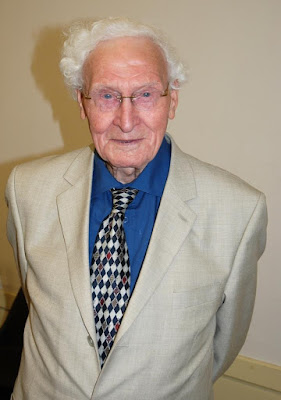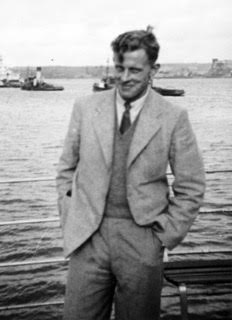Sir Walter Raleigh and Music
Professor
Ivan Roots
Back in 2009, the late and great Ivan Roots,
Emeritus Professor of History at Exeter University, was kind enough to give a
talk in Budleigh Salterton about Sir Walter Raleigh’s poetry.
The event was a prelude to a
performance of ‘Even such is Time’, the cantata by local composer Nicholas
Marshall which is based on one of Raleigh’s most famous poems.
I wrote about Professor Roots’ talk at
http://budleighbrewsterunited.blogspot.co.uk/2009/07/onion-not-potato.html and
remember his conclusion that Sir Walter was ‘not a great poet’. Although
Raleigh’s later poems made ‘quite good, subtle points’, he conceded, much of
the early stuff was extremely conventional, ‘addressed to imaginary women like
hundreds of other courtly compositions of the age’.
Professor
Dodsworth’s edition of the poems, entitled Sir Walter Ralegh: The Poems, with other Verse from the Court of Elizabeth I was published by Everyman
Paperbacks in 1999
Music and poetry were valuable commodities in
Renaissance high society. Raleigh, as Professor Martin Dodsworth writes, was a
climber: ‘poetry was one of the means by which he climbed’. And in what his biographer Raleigh Trevelyan
calls the ‘shark pool’ of Elizabethan court politics – where a line of poetry
could land you in royal disfavour or reward you with a thousand acres of a
country estate – music was, to quote Dr Katherine Butler, ‘simultaneously a
tool of authority for the monarch and an instrument of persuasion for the
nobility.’
Conventional they may have been, but Sir Walter’s
verses were highly popular with contemporary composers. A good example is his ‘Farewell, false Love’, set to music by
William Byrd and published in 1588 in Psalmes,
Sonets, and songs of sadnes and pietie.
Authorship of many verses ascribed to Sir
Walter is a problem, but Trevelyan is one writer who believes that two further
poems were penned by Raleigh and used by Byrd. ‘Wounded I am’ and ‘See those
sweet eyes, those more than sweetest eyes’ were published in the 1589 Songs
of sundrie natures.
Another poem sometimes ascribed to Raleigh is ‘Like
hermit poor in pensive place obscure’, set to music by Alfonso Ferrabosco the
Younger and published in Ayres (1609).
English composer Orlando
Gibbons (1583-1625) by an unknown artist
A poem widely recognised as Raleigh’s is
‘What is our life?’, used by the leading early 17th century composer
Orlando Gibbons and published as ‘What is Life?’ in The First set of
madrigals and motetts (1612).
Here’s the
full poem:
What is
our life? It is a play of passion.
What is
our mirth? The music of division.
Our
mothers, they the tiring-houses* be,
Where we
are dress'd for time's short tragedy.
Earth is
the stage, heaven the spectator is
Who doth
behold whoe'er doth act amiss.
The graves
that hide us from the parching sun
Are but
drawn curtains till the play is done.
*i.e
'attiring rooms' as in a theatre.
An indication of Raleigh’s standing among
Elizabethan musicians is the fact that a special piece – ‘Sir Walter Raleigh’s
Galliard’ – was composed and dedicated to him by the lutenist Francis Cutting.
Image credit: Reinhold Möller
It’s good to know that, in some places which have
links with Raleigh, music associated with him will be part of the 400th
anniversary events marking his death.
The London-based choral director and
conductor Aidan Oliver told me that 29 October 2018 was ‘a significant
anniversary which clearly has great relevance’ for St Margaret’s Church,
Westminster, where he is Director of Music.
‘At the very least, I would expect
that the choir could sing one of the settings of his beautiful ‘Even such is
time’ at our Sunday Eucharist on the previous day.’
St Margaret’s, of course, next to Westminster
Abbey, sits alongside the Houses of Parliament, and Aidan is responsible for
the music at many high-profile Parliamentary occasions.
Image
credit: http://www.westminster-abbey.org/
It’s there that you can see the Raleigh memorial
window over the west door, installed in 1882 and subscribed for by American
donors.
At the top angels hold banners with the arms of the United States of
America and the Royal Arms. Below, various angels hold other coats of arms and
Tudor emblems. Five figures are shown in the main window - Elizabeth I, Henry,
Prince of Wales, son of King James I, Raleigh himself, the poet Edmund Spenser,
and Sir Humphrey Gilbert, the celebrated navigator and Raleigh’s half-brother.
Panels represent Raleigh sailing for America, his
landing there, Spenser presented to the Queen by Raleigh, his imprisonment and
burial. The inscription was composed by James Russell Lowell, the poet and
diplomat who was US Ambassador in London at the time of the unveiling:
"The new world's sons from England's breast
we drew, Such milk as bids remember whence we came; Proud of her past, from
which our present grew; this window we inscribe with Raleigh's name".
Also in St Margaret’s, Westminster, is a brass
memorial on the south east wall of the church, given in 1845 by the Roxburghe
Society, replacing one of wood which had decayed. This includes Raleigh’s coat
of arms (gules, five lozenges in bend, argent). The inscription reads:
"Within ye chancel of this church was
interred the body of the great Sr. Walter Raleigh, Kt. on the day he was
beheaded in Old Palace Yard, Westminster Oct. 29th Ano. Dom. 1618. Reader -
should you reflect on his errors Remember his many virtues and that he was a
mortal."
Holy Trinity Church, Exmouth
Nearer to Raleigh’s birthplace in East Budleigh, Devon, is Holy Trinity Church
Exmouth.
This is one of the prayers mentioned by Revd James
Hutchings:
Give me my scallop shell of quiet,
My staff of faith to walk upon,
My scrip of joy, immortal diet,
My bottle of salvation,
My gown of glory, hope’s true gage,
And thus I’ll take my pilgrimage.
It’s actually the first six lines of 58, of
a poem entitled ‘The passionate man’s pilgrimage’.
The
Budleigh Salterton Male Voice Choir’s 2017 Christmas concert is on 16 December 4,
2017
What else in 2018? Well, I’m no musical expert and
wouldn’t dare call myself a poet. But I do dabble in verse, and I was pleased
to hear that the Budleigh Salterton Male Voice Choir plans to perform my ‘Sir
Walter’s Lament’, to the tune of ‘Greensleeves’ at their Christmas concert,
probably on 15 December 2018, in St Peter’s Church, Budleigh Salterton.
I was so excited by the news that I took out my
quill and composed ‘A Hero of Devon’, which I wrote to the beautiful tune of
‘The Ash Grove.’ You can hear it being beautifully played at https://www.youtube.com/watch?v=mcmCTuFaxW8
Here are the words:
1. A Hero of Devon
–
We hope he’s in
Heaven –
He lived in the
time of Good Queen Bess.
They said he was
proud:
His clothes were so
loud.
He had his faults
we must confess.
His surname is
Raleigh,
Or maybe it’s
Rawley,
And as for the
spelling nobody is sure.
We’ll call him Sir
Walter
Queen Bess called
him Water.
He loved her to
bits but we’re sure it was pure.
2. His cloak on a puddle,
He said ‘T’is no trouble!
Your Majesty’s feet will now not get wet!’
The Queen smiled and said,
‘We cannot be wed.
But please do become my favourite, pet!’
Sir Walter became
The man in the frame.
Potatoes won fame as his favourite dish.
Virginia known
For Queen Bess on her throne.
A pipe of tobacco his dearest wish.
3. With bicycles too
His fame grew anew.
His poetry also was not bad at all.
But Bess’ successor,
A man so much lesser,
Did craftily bring about his fall.
He stood on the scaffold.
The crowd were so baffled
To see English justice had gone amiss.
Sir Walter take praise!
Our hero from Hayes
Who wrote loads of poems much better than
this.
Now, if anyone reading this would like to use
my verses to pay a musical tribute to Sir Walter I would be delighted to hear
from you.
But seriously, there’s much fine Elizabethan
music, and verses much finer than mine, which could be performed at concerts
big or small. The only connection with Raleigh is that they are of his
time.
I’ve noted a few here, along
with a link for you to hear them. The first is Thomas Morley’s ‘It was a lover
and his lass’ from Shakespeare’s ‘As You Like It’. Another well known
Shakespeare piece is The Wind and the Rain from ‘Twelfth Night’ which you can
hear at
I rather liked John Dowland’s ‘Fine
knacks for ladies’.
And I’m now so enthused by the idea of helping to
mark Raleigh 400 with music that I suggested to some friends that we should
form a select singing group called, provisionally, ‘Walter’s Wailers’. We would
perform, probably in intimate venues like the pub, or if we get really
enthused, on the street.
If you’d like to have some fun and join us, do get
in touch.
You can now read a growing mass of material about Sir Walter's 400th anniversary at http://raleigh400.blogspot.co.uk/
You can now read a growing mass of material about Sir Walter's 400th anniversary at http://raleigh400.blogspot.co.uk/
















Comments
Post a Comment